Speaking at the 2025 Agritech Smart Agriculture Forum in Cairo, industry expert Nic Jooste emphasised that sustainability must evolve from an external obligation to a core business strategy if Egypt’s fresh produce sector is to remain competitive in international markets

In the global fresh produce sector, the conversation around sustainability is shifting… fast. What was once an exercise in compliance has become a defining element of competitiveness.
I spoke at the 2025 Agritech Smart Agriculture Forum in Cairo, where I emphasised a central message: sustainability, if it is to be effective, must evolve into a deliberate, performance-driven business strategy.
Egypt is one of the world’s oldest agricultural regions. And like many other fresh produce nations, it sits at a crossroads of innovation and necessity.
It faces water scarcity, soil salinity, energy pressures, and increasing global market scrutiny, and its fresh produce sector can no longer afford to treat sustainability as an external obligation. It must be embedded in the core of operational and commercial planning.
A sector under pressure
Growers and exporters must contend with unprecedented challenges:
- Unpredictable rainfall and rising soil salinity
- Escalating input costs, especially for water, fertiliser, and fuel
- Labour shortages and rural youth migration
At the same time, international buyers – from European retailers to multinational processors – no longer focus solely on product quality and price. Instead, procurement strategies increasingly demand verifiable progress on the following:
- Water footprint reduction
- Emissions transparency
- Gender equity in operations
- Compliance with deforestation and traceability regulations
- Community-level impact
These demands are fast becoming market access criteria.
From compliance to credibility
In previous decades, certifications were the benchmark. A GlobalGAP or Sedex certificate might have been sufficient to open doors. Today, buyers ask more difficult – and more specific – questions:
- Can you demonstrate a reduction in resource use per hectare?
- Do you have measurable impact data on your social programmes?
- Are women and youth included in decision-making roles?
This shift reflects a broader transition from a compliance model to an impact-based preference model. Buyers prioritise suppliers who can show concrete improvements, not just audit reports.
Water, energy, food
Egypt’s agriculture sector is uniquely situated within what is known as the Water-Energy-Food nexus. With over 80 per cent of the nation’s freshwater allocated to agriculture, and energy costs affecting everything from irrigation to coldstorage, integrated decision-making is essential.
Nexus thinking isn’t theoretical, it already drives business decisions:
- Transitioning from flood to drip irrigation can reduce water use by over 30 per cent
- Replacing diesel with solar energy stabilises input costs
- Shifting from monoculture to intercropping improves soil moisture and carbon retention
These are much more than sustainability improvements: they are competitive advantages.
The RootGrow model
A compelling practical example of this integration is the RootGrow Cluster, an Egypt-based initiative involving Dutch and Egyptian partners led by Jaguar The Fresh Company. Key results to date include:
- 40 per cent improvement in survival rates for citrus trees via salt-tolerant rootstocks
- Over 30 per cent water savings through targeted drip irrigation
- Real-time crop monitoring using satellite data
- Youth and women trained to manage nursery and field operations

Beyond agronomic success, RootGrow also focuses on delivering commercial outcomes:
- Improved fruit uniformity
- Lower packhouse rejection rates
- Increased export interest from EU buyers looking for transparent supply chain partners
Jaguar is proving that the RootGrow approach represents a scalable model that connects local agricultural realities with international market expectations.
Private sector role
Governments and development agencies play a role in setting frameworks and offering incentives, but it is the private sector that determines real outcomes.
Choices about fertiliser, irrigation, labour, and logistics are made by producers and exporters, not policymakers.
When businesses integrate sustainability into daily operations, they build:
- Resilience – protecting against climate volatility, market shocks, and resource risks
- Reputation – strengthening relationships with buyers, financial institutions, and employees
This is corporate social responsibility that involves long-term risk management and value creation.
Practical model for change
Based on 25 years working with businesses across Africa, the Middle East, and Europe, I use a simple but effective five-step approach to embed sustainability in operations:
- Discovery – Identify the issue that threatens your future competitiveness
- Alignment – Build internal consensus across staff and leadership
- Prioritisation – Focus on one area (for example water, energy, or gender) and set targets
- Implementation – Start with pilots, gather data, refine your approach
- Evaluation – Be transparent about results, improve continuously
This approach is used by smallholder clusters as well as multinationals. It turns intention into measurable action.
Social sustainability as foundation
Environmental goals often fail when social factors are overlooked. In our own experience with projects like Little Libraries in South Africa, Stars in Their Eyes youth leadership programmes, and Women Taking the Lead gender empowerment training, we have seen how education, inclusion, and dignity drive better performance.
When farm workers are trained, empowered, and retained, sustainability systems – from irrigation to data monitoring perform – they perform more effectively. Social sustainability is not a form of philanthropy: it is an instrument that brings operational stability.
Global shift is already underway
Consider these current trends:
- Retailers like Tesco and Carrefour who mandate climate disclosures
- Multinationals that invest billions in regenerative agriculture
- Regional players like Majid Al Futtaim which require traceability in water and energy use
The message is clear: buyers want partners who can prove impact, not just claim it.
A strategic imperative
In Egypt’s case, the nation has the land, the human capital, and the urgency to lead in sustainable agriculture. But leadership will depend not on rhetoric, but on execution.
The future will be shaped by those who can integrate sustainability into their core business strategy, building systems that deliver both economic and environmental value.
It’s time to move from impact to influence.
This comment piece is based on a talk given by Nic Jooste at the 2025 Agritech Smart Agriculture Forum in Cairo.



